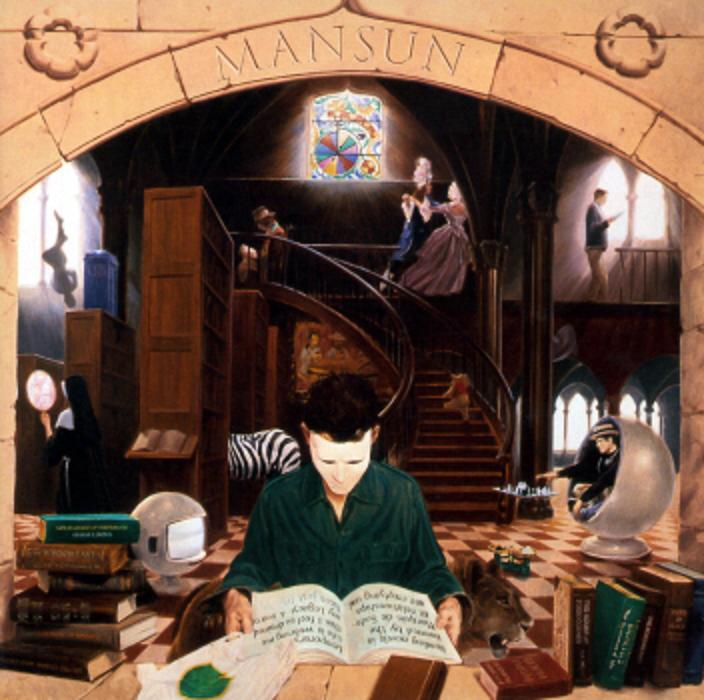Part 47 of a series that will run throughout 2013 as I discuss records that have affected me throughout the years – Flashback Fridays
In 1997 at some point – the exact details are hazy – a friend and I set out to see a show at the TLA on South Street in Philadelphia. The headliners were a band called The Seahorses, featuring John Squire, formerly of The Stone Roses. Although I had their record, I really wasn’t there to see them (and as it would turn out, I wouldn’t even stay for their set that night). The opening band was a band called Mansun who had recently released their debut record, Attack of the Grey Lantern.
The mid 90’s was a strange time period for a wannabe hipster latching onto the Britpop scene. Oasis, Blur, Pulp, and Suede (that’s The London Suede for us Yanks) were all clearly within the genre, but there were dozens – if not hundreds – of bands that didn’t quite fit so neatly into the tag. I bought anything I could that was lumped into the scene, sometimes based on an article I’d read in an import music magazine whilst killing time at Barnes & Noble. I’d read about Mansun, and their glam inspired look combined with decidedly non britpop musical leanings pulled me in. Their 1st record quickly became a favorite of mine, culminating with the show I caught at the TLA. They ended their set with an incredible version of their 1st single “Take it Easy, Chicken” and my friend and I felt like there was no way The Seahorses – John Squire and all – could ever top Mansun. And so we left the venue. Upon reflection, this may have signaled the end of my personal Britpop phase.
How does a band follow-up a debut record that was massive in the UK and even scored a minor hit in the US? Some bands might refine the approach of the 1st record. Some bands might branch out a bit whilst retaining elements of their signature sound. Mansun wrote snippets of songs and decided to splice them all together to create something wholly original. Progressive rock? Britpop? Glam? Nothing really seems to apply, yet everything does. It is a difficult album to be sure, but it has remained a favorite of mine over the last 15 years (UK edition only, the US version was a watered down, bastardized version). The 1st thing you’ll notice is the cover art – references to Dr. Who, The Book of Mormon, A.A. Milne, and George Orwell among others. Six is a difficult, intense record. It is also my favorite Mansun album, slightly edging out their debut.
All my life, what I mistook for friendly pats on the back were really the hands that pushed me further and further down (album breakdown)
Six – the title track starts off in misleadingly straightforward fashion. the signature Mansun guitar sound fades in as Britpop guitar strumming joins in, sounding like it is building towards a chorus. It kind of does that, but not before breaking down and starting all over. By the 3 1/2 minute mark we are entering a 70’s Pink Floyd instrumental interlude and the song has shifted several times. The last few minutes have Paul Draper sighing “Life , it’s a compromise anyway” before shifting back into the sound of the earlier part of the song. A mouthful, but it is a stunning work of art. Skip the edited single version, stick with the 8 minute album version.
Negative – that space Pink Floyd-ish – oh hell, Mansun-ish – guitar tone runs through this track offering up a catchy track that was another single. Lyrically, we are continuing on with themes of compromising. Fairly straight forward, this is a modern progressive rock track with a soft spot for melody. Key lyrics: “Have you ever told a lie to hide a lie? / Shame on you, you’ve compromised again”
Shotgun – Shouted lyrics before shifting into a laid back vibe. This track features some of the more obscure lyrics on the record, with mentions to Winnie the Pooh, Confucianism, Buddha, intermingled with violent imagery and a longing child-like simplicity. All in a days work, lads. The minor guitar solo towards the end of the track provides an eerie lead as the band moves towards an almost funk-like workout, leading right into
Inverse Midas – a piano ballad, hauntingly beautiful featuring these words “Everybody helps me make my own mistakes / If I’m left alone I’d make them anyway”. A very short song, it ends with burst of guitar signaling the start of
Anti Everything – one of my favorite song titles of all time, it’s another shorter track. Starts out as a nod to the Britpop of the 90’s sound but still finds time to have a little interlude. Mumbled lyrics to contrast with the strong (and catchy) chorus.
Fall Out – It probably seemed like a great idea to include a sample from The Nutcracker as the introduction to this song and as the piece of music that holds the track together. And honestly, it IS a great idea. Mysterious, disjointed, cohesive. A study in contradictions. And the album has only begun to get strange, honestly. Blistering guitar solo in the middle of the song, verses that don’t seem to jive with the music. A mind warp. And perfect. “And you talk of euthanasia / And your breakdown was so cool / Did Stanley Kubrick fake it with the moon?”
Serotonin – A 2:33 blast of Britpop, with just a hint of the disjointedness that has been on display thus far.
Cancer – To say that this song is challenging would be an understatement. It starts out with an almost metal guitar passage before shifting into a space rock glam workout. The tones Dominic Chad comes up with on his guitar are lush with melody (as they are throughout the record). Everything gives way to an acoustic sing-a-long of the lyric “I’m emotionally raped by Jesus”. A song wrapped in questions of faith (or lack thereof). The acoustic section fades away and we are left with jack hammer like percussion with sweet singing by Paul Draper which in turn fades to an extended instrumental section. Stove King on bass and Andie Rathbone on drums might not get as many mentions as Dominic Chad and Paul Draper, but they prove their chops here. A piano refrain ties everything together, orchestral in nature. Stunning
Witness to a Murder (Part Two) – a track designed to signify the end of part 1 to the record, it is a monologue narrated by Tom Baker of Dr. Who fame. A song about the death of Brian Jones (of The Rolling Stones), complete with harpsichord and opera singers sounds about right for this record. Oh, and it is perfect.
Television – a slow burner of a song, it is heavy on atmosphere and takes a few minutes to get to the chorus – and what a chorus it is. A damnation of the ill effects of watching too much T.V., the chorus is an aching lament, completely delivering on the slow build. “Thru’ my T.V., through my T.V. / All my problems come”
Special / Blown It (Delete as Appropriate) – the musical introduction lasts well over a minute, but is infused with enough intrigue and melody to make it…well…special. When the vocals and band kick in at the 2:20 mark, it is with a fierceness that is unmatched elsewhere on the record. A sense of hopelessness permeates the words, resignation and anger coexisting. “But I fucked it up, shot my load / Spewed onto the motorway shoulder / I could have been somebody special”
Legacy – Anger gives way to complete and utter resignation, this track is perfectly sequenced on the record. This was Mansun’s biggest hit, landing at #7 on the UK charts. Mid tempo with soaring guitar licks, it name checks the Marquis de Sade and features lyrics such as “all relationships are emptying and temporary” as well as the repeated refrain “Nobody cares when you’re gone”. A perfect song. After that uplifting number, we head to the concluding song which is
Being a Girl – Britpop prog glam? Labels are always a chore when it comes to Mansun. The song starts off with a chanted refrain that wouldn’t sound out-of-place in the mid 90’s Britpop scene. It moves towards harder edged territory culminating with the catchy chorus, recitation of the song’s title. Staying true to the album, everything comes to a grinding halt and shifts in tone, washes of synths complimenting the vocals. The constant is the chanting of the song’s title, eventually leading back to where everything started. A mini capsule of the album’s aesthetic.
This album wasn’t really understood when it was released but it slowly has gained an audience over the last decade or so. I firmly believe it is a modern classic of the progressive – glam – Britpop genres. This series will return in mid 2014 as I discuss Split by Lush.
[youtube=http://www.youtube.com/watch?v=RCGt9jZtASA&w=480&h=360]
[youtube=http://www.youtube.com/watch?v=BnyHcDZHvko&w=480&h=360]


